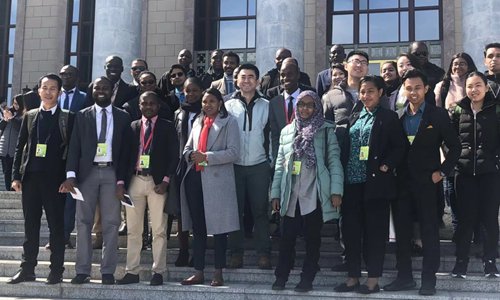
A group of foreign journalists pose for a photo in front of the Great Hall of the People on Friday morning prior to the closing ceremony of the 13th National People's Congress. Photo: Cao Siqi/GT
As the most important political events in China, the two-week annual legislative and political consultative sessions have drawn an increasing number of foreign journalists, indicating a growing interest from the international community in the rise of a more open and confident China.
Although thousands of foreign journalists were invited to cover the annual legislative assembly, there was a distinct increase in the number of journalists from Africa and other countries participating in Belt and Road Initiative (BRI) projects.
Even though the Government Work Report was delivered in Putonghua by Chinese Premier Li Keqiang, the reporters listened carefully and took notes on the paper copy of Li's speech, which was published in multiple languages.
Numerous journalists told the Global Times that it was a privilege to enter the Great Hall of the People and attend the sessions. Comparing them to similar political meetings in their own countries, they hailed the Chinese government's efforts in poverty elimination and its anti-pollution campaign.
China's rapid economic development spurred their intense interest in how China's policies, especially the future plans of the BRI, might impact their countries.
They said the "two sessions" - the colloquial terms for the annual gatherings of the National People's Congress (NPC) and the National Committee of the Chinese People's Political Consultative Conference (CPPCC), China's top political advisory body - are no longer only about China. The resulting laws and policies have come under the global spotlight as they wield great influence on the world's economy and political discourse.
Tradition & modern meetings
"I feel so excited to be part of the foreign journalists who are privileged to enter the Great Hall of the People in China's capital, Beijing. I have gained new experience on how the sessions operate in China, compared to my home country Tanzania. It is a golden opportunity for me," Deogratius Kamagi, a Tanzanian reporter, told the Global Times.
Writing stories in English and Kiswahili, Kamagi focuses his reports on the BRI and repeatedly mentions that Tanzania is one of the African countries that have benefited from the initiative.
Md Enamul Hassan, a journalist from Bangladesh, said he was overwhelmed by the opportunity to witness China's unique political system for the first time. Covering the sessions gave him an in-depth understanding of how the Chinese government runs the country from tackling pollution problems to creating jobs.
Many foreign reporters told the Global Times they were surprised by the ethnic diversification of the NPC deputies and CPPCC National Committee members. Those representing China's 56 ethnic groups often wear traditional outfits to the two sessions.
Anis Benhedouga, a reporter from Algeria, said those traditional outfits show the cultural richness of China.
A number of foreign journalists also marveled at the advanced technology used by Chinese reporters.
"There's a 5G experience area in the media center that I thought was really interesting. It shows China's determination to push forward new technology and artificial intelligence," Jeremy Koh, senior correspondent for the Singapore-based Channel NewsAsia, told the Global Times.
High-tech intelligent products, including the world's first AI female news anchor, shined during the two sessions. Augmented reality glasses also attracted people's attention as they not only provide live-streaming, but also facial recognition of someone the wearer is looking at.
Global influence
Kamagi said China's two sessions are a worldwide influencer. Foreign journalists covering the event have closely followed up the panel meetings to gain further insight into China's foreign policies and cross-border issues.
For himself, he is most interested in issues relating to China-Africa cooperation and the BRI in particular.
Tanzania is one of the countries that have joined the BRI. The initiative is part of China's top priorities in 2019, and this means my country has been considered in China's work plan and budget for this year, he said.
Kamagi said Tanzania is one of a number of African countries that receive aid from China, and it was good to hear assurance from the Chinese Premier and Foreign Minister that the support China is offering to developing countries is not a debt trap, but cooperative projects.
Benhedouga said foreign journalists have been closely following the decisions reached at the two sessions and even those affecting China's local areas can have an impact on his country.
"For example, the Chinese government plans to reduce coal consumption and replace it with renewable energy and natural gas. As an Algerian journalist who belongs to a major gas producing country, I can say that this decision [will have] an impact on global gas production that can influence gas prices," he said.
Another example, said Benhedouga, is the lawsuit Huawei filed against the US government, and Chinese State Councilor and Foreign Minister Wang Yi's pledge to support the company and encourage it to take all necessary steps to seek justice. This shows the Chinese government's confidence, said Benhedouga.
The Bangladeshi journalist also said that many decisions made at the two sessions will have an impact on his country and the world.
"The decisions made regarding BRI are indirectly linked to the interests of my country," he noted.
As a reporter from Singapore, a country largely dependent on foreign trade, Koh said that the policies, announcements and political trends emanating from the two sessions will impact the world economy.
"Specifically, China's GDP data, tax policies and China-US trade frictions will greatly influence the business sector in Singapore and affect their investment plans," he said.

